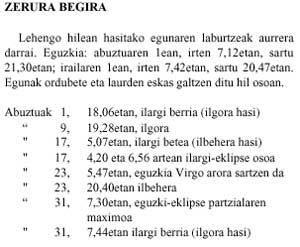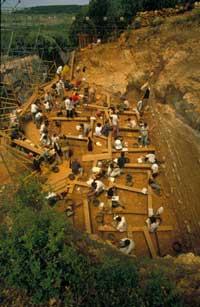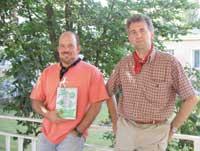Juan Luis Arsuaga: “Scientific disclosure is an industry and so we must treat it”
2010/05/13 Carton Virto, Eider - Elhuyar Zientzia | Lakar Iraizoz, Oihane - Elhuyar Zientzia
K riticos have been the paleontologist Juan Luis Arsuaga and the geneticist Luis Serrano at the opening of the Forum Media for Science. Arsuaga takes the floor after the welcome message from FECYT director Lourdes Arana, and addresses the issue correctly.
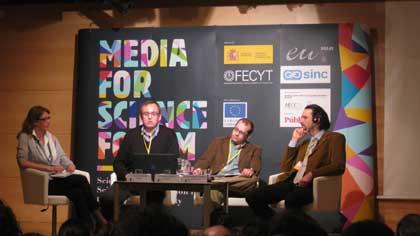
Arsuaga wanted to launch the forum with an analysis of what science is and not communication. Specifically, he has analyzed what science is. If Ferran Adriá is a scientist, we have to start asking ourselves what science is," he said.
Arana has presented the Citizen Agenda of Science and Innovation project, promoted by FECYT, which the speakers have spoken about. With this project, anyone can vote for a challenge that wants to materialize in 2030, being Ferrán Adriá one of the "scientists" who present the 14 challenges. Neither Arsuaga nor Serrano have seen with good eyes the vision of the project. "One thing is that society is competent to decide what to do with the technology developed by scientists, and that, of course, if applicable; another is that society decides directly where to investigate and where not," said Serrano. In Serrano's opinion, society and politicians have neither criteria nor solid knowledge to decide the latter, nor too much interest in deepening science, so it considers it dangerous to put these kinds of decisions in the hands of society: "that I never know a scientist has been invited to the Spanish congress to talk about the challenges of science, as is done in the United States."
Arsuaga highlights the need to differentiate between education and dissemination in the systematic analysis of scientific communication, as well as dissemination and essay. "But how to distinguish it? Education for children, adult outreach? One mandatory, another volunteer? Where does one end and where does the other begin? ". Arsuaga has presented as a burden the definition of scientific writings as disclosure. He has argued that they write scientific literature: "Dawkins and Lovelock do not divulge," he said, "and Gould did not. I have never heard of Kant spreading philosophy!" When scientists write about their subjects, everyone does the same: take a vision and give them a vision. "And that's an essay, it's not disclosure. They spread ideas and some have had a great influence on science, although they have never won Nobel prizes," he said.
Arsuaga has clearly defended that disclosure is also an industry: "books, museums, travelling exhibitions, are bought, rented and paid. They are commercial products and we must not forget. The money moves there." He comments that the communication of science is often associated with a moral obligation, leaving aside its industrial side, and that it is a mistake to do so. As an industry, Arsuaga stressed that there are exporters and consumers, and that "since the time of Rodríguez de la Fuente" nothing has been made exportable in the audiovisual sector in Spain.
Arsuaga highlighted the need to develop a strong industry that allows scientific leaders: "Disclosure is committed to telling the protagonist himself, to be first-hand, because it brings closeness to society. The message does not come the same if it has been told by a member of his society, because we are social primates."
As for the proximity of scientists, Serrano has done a bit of self-criticism and has stated that many scientists do not know how to talk to the public: "We know how to talk to other scientists, but I'm seeing scientists sink into the debate with a creationist because they don't know how to deal with this kind of debate. They have to learn."
Serrano has also referred to the risk of confusion between scientific data and moral attitudes. "In fact," he said, "political correctness sometimes clashes with scientific debate; it can be a source of misunderstanding to talk about the genetic origin of homosexuality or statistical genetic differences between ethnic groups." The same for nature sciences: "Both advertising and pseudo-scientific use seriously undermine the prestige of science."
Amateurs vs journalists
The second part of the day has been dedicated to ordinary scientific journalism and the rise of scientific blogs. Scientific blogs are fashionable and proof of this are the data provided by Wicho de Microservos: more than one million visitors per month and 100,000 people subscribed to the blog's RSS feeds.
Wicho has considered the rise and the number of followers of blogs dedicated to scientific topics as a sign of the triumph of the disclosure made by fans. "Should science journalists start looking for another job?" then one of the listeners asks. In such a forum, the debate on the situation of the journalist profession and the media crisis cannot be avoided.
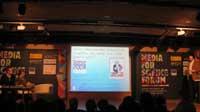
Several phrases
BBC journalist Quentin Cooper:
"Communication is not something that must be added to science, but something that is its own."
"Science is not a remedy or a threat, as some media believe."
Luis Serrano, Deputy Director of the Center for Genomic Regulation:
"I've seen scientists sunk into the debate with a creationist, because they don't know how to deal with such debates. They have to learn."
"Is Cervantes useful? Science itself is beautiful, we have to recover the concept of knowledge per se."
"Politicians say they love science, but within two minutes of saying it they forget it. And as long as they don't do it with more interest, they can only donate money for sound issues."
"If any research issue reports an immediate benefit, it will be the industry that protects it, otherwise it will be the public bodies."
"People have to decide what we use the technology we develop for. There you have to involve people and politicians to decide. But don't decide if we have to research genetics, without solid criteria."
Juan Luis Arsuaga, paleontologist:
"Learning effortlessly is useless. The prize is in the effort."
"Science should not be fun, it has to be interesting."
"Politicians don't know that the exercise of science is a contest and that there are competing scientists around the world, if they become aware of it they would see what resources scientists need to investigate."
"The BBC does not produce documentaries to favor humanity, but to sell and earn money with it."
Wicho, Microservants blogger:
"Web 2.0 is a sign of the success of the hobby; the web 2.0 world is changing, because a direct communication between scientists and users has been opened."
Pablo Jauregi, scientific journalist for El Mundo:
"The scientific section of newspapers is essential for scientific journalists to have a voice and continuity in the newspapers."
"Scientific news is widely read in newspaper digital editions, especially when they come out on the front page. This is very important because it can have the strength to decide which news to put next in the print edition."
Tim Radford, journalist for The Guardian:
"One of the problems is the language of science, unknown to most people. I once asked the director of the Oxford Dictionary the words that biology has given to the dictionary: 60,000, he told me. Shakespeare wrote his entire play with 30,000 words! ".
"You have to go to the scientists, ask and talk to them, where the journalist will find the stories."

Gai honi buruzko eduki gehiago
Elhuyarrek garatutako teknologia




